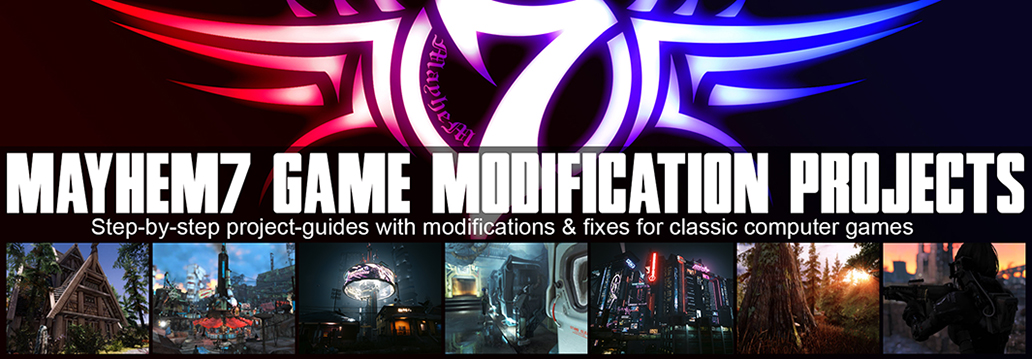![]()
AVATAR: THE GAME - HDR RESHADE
ABOUT THIS MOD:
HDR ReShade with better colors and image
clarity.
Mod author: Tore Andersen.
James Cameron's Avatar: The Game, developed by Ubisoft Montreal and published by
Ubisoft, Lightstorm, Fox Digital & Gameloft in 2009. Prequel to the 2009 Avatar
movie. Even though the game was based on a movie, and clearly relied on the
wow-effect of the 3D technology, the game was (and still is) actually pretty
good. This custom ReShade will add some new effects like reflective
bump-mapping, ambient lighting, better AA, better colors and improved image
clarity.
Requirements:
James Cameron's Avatar: The Game (Any version)
Installation:
Download and unpack into the game-folder.
SCREENSHOTS
ReShade
Original
ReShade
Original
![]()
![]()
![]()
![]()
SUPPORT MAYHEM-7 MODS
GAME INFO
James Cameron's Avatar: The Game is an action-adventure video
game developed by Ubisoft Montreal and published by Ubisoft. The game is based
on James Cameron's 2009 film Avatar and allows players to experience the world
of Pandora in a whole new way. The game was released on multiple platforms
including Xbox 360, PlayStation 3, PC, Wii and Nintendo DS.
The gameplay of James Cameron's Avatar: The Game is set in an open-world
environment, with players taking on the role of a human or an Avatar, depending
on the mission. The human side of the game is focused on first-person shooter
gameplay, with players using a variety of firearms to take out the hostile
native Pandoran species, the Na'vi. As an Avatar, players use melee combat and
the ability to ride the local creatures, called Ikran to take out enemies. The
game also features stealth elements, allowing players to sneak past enemies or
take them out silently. The game's campaign also includes a variety of side
missions and challenges that players can complete to earn rewards and unlock new
abilities.
The graphics of James Cameron's Avatar: The Game are highly detailed and
realistic, taking full advantage of the advanced technology available at the
time of its release. The game's environments are beautifully rendered, featuring
lush jungles, towering mountains and sprawling canyons. The game's characters
are also highly detailed, with realistic animation and expressive facial
features. The game also features stunning special effects, such as the use of
motion capture to create lifelike movements of the characters.
The development of James Cameron's Avatar: The Game was a collaboration between
Ubisoft Montreal and James Cameron's Lightstorm Entertainment. The game's
development team worked closely with Cameron and his team to create a game that
would accurately capture the feel of the Avatar world. The game's development
was not without its challenges, with the team facing a number of technical
difficulties and a tight deadline to release the game in conjunction with the
film's release.
James Cameron's Avatar: The Game was released in December 2009, a few weeks
before the movie. The game received mixed reviews from critics, with many
praising the game's visuals and attention to detail, but criticizing the game's
repetitive gameplay and lack of originality. Despite this, the game was a
commercial success, selling over 2 million copies worldwide.
Overall, James Cameron's Avatar: The Game offers players a unique and immersive
experience, allowing them to explore the world of Pandora and interact with its
inhabitants in a whole new way. The game's visuals and attention to detail are
truly impressive, and the game's open-world environment allows players to fully
explore and discover the many secrets of Pandora. While the game's campaign may
be criticized for its repetition, the game's multiplayer mode and side missions
add a lot to the replayability of the game. The game also allows players to play
as both human and Avatar, which adds a lot to the gameplay experience.
In conclusion, James Cameron's Avatar: The Game is a game that is worth playing
for fans of the action-adventure genre. The game's unique take on the Avatar
universe is something that sets it apart from other games in the genre. The
game's visuals, gameplay and open-world environment make it a memorable
experience that will stick with players long after they've finished it. The
game's development was challenging but the final product is a game that is worth
playing for fans of the Avatar franchise and the action-adventure genre.
James Cameron's Avatar: The Game is a 3rd-person action game based on the 2009
Avatar movie. The game was developed by Ubisoft Montreal and released in 2009
alongside the movie. It uses the same stereoscope 3D technology as the movie,
which undoubtedly was a huge sales point. The game takes place before the
timeline of the movie, and features some of the same actors, including Sigourney
Weaver, Stephen Lang, Michelle Rodriguez, and Giovanni Ribisi. Unfortunately the
online part of the game was shut down in August, 2014, and the Game is no longer
sold on Steam. It can however still be purchased on Amazon or in local
game-stores, and the single player campaign, which is the main focus of the
game, is still fun to play.
Avatar: The Game starts in 2152, about years before the events of the movie. A
signals-specialist arrives at Pandora, and is assigned to an area called Blue
Lagoon. The first mission is about saving 5 marines from Viperwolves. After
saving the marines, the player must go help another signals-specialist, Dalton,
who is trapped outside the fence. After fixing the fence, the player is told to
enter an avatar and get some cell samples from a certain plant. After getting
the sample, a Na'vi, askes the player to kill his infected animals. An air
strike is then launched on the Na'vi village. A commander and his soldiers
arrive via helicopter. The player must now make the game-altering decision of
siding with either the Na'vi or the humans. The rest of the game completely
depends on this choice, as it will determine what side of the coming war the
player will be. The rest of the game is a battle for territory.
Development of the game started in 2007 alongside the making of the film, and in
cooperation with James Cameron. The game requires a HDMI video connection and a
display with at least 120Hz in order to use the 3D effects. It can use most
standard stereoscopic 3D formats used by today's "3D-enabled" screens. The 3D
was only supported in the PC release of the game.






